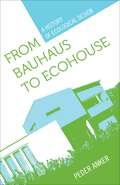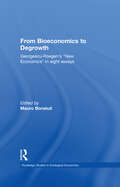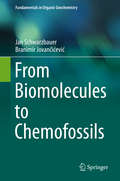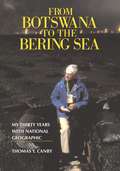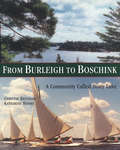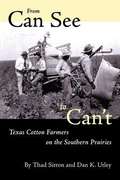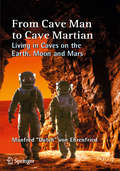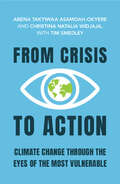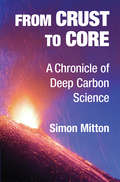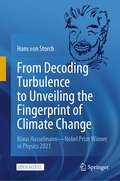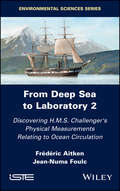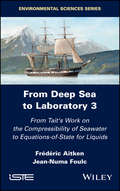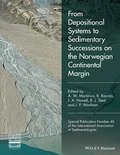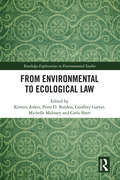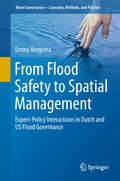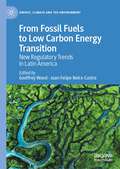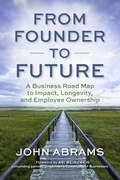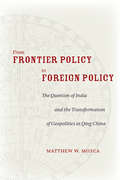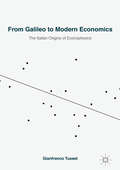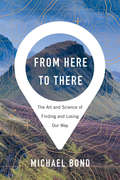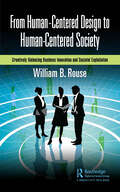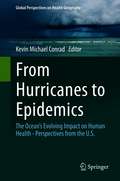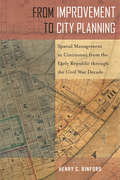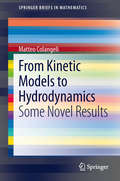- Table View
- List View
From BAM! to BURP!: A Carbon Atom's Never-Ending Journey Through Space and Time and YOU
by Melissa StewartFollow a carbon atom on its incredible adventure over billions of years. It&’s been part of many things—from early volcanic gases, to plants that dinosaurs devoured, to your breakfast burp!By award-winning children&’s author Melissa Stewart, this epic nonfiction picture book for 5-8-year-olds is a perfect blend of science and history that STEM-seekers will eat up!Long ago, the young Earth crashed into a smaller body called Theia. Matter blasted through space, and the carbon atom was trapped deep inside Earth until a volcano erupted, thrusting tons of ash and gases—including the carbon atom—high into the sky.Over millions of years, the carbon atom has been part of all kinds of things, including plants and dinosaurs, eggshells and seashells, a lump of coal, and even a sheet of toilet paper! Not long ago, it became part of a towering maple tree and then a drop of maple syrup. Just imagine that the syrup ended up on YOUR pancakes and then inside your body. And when you let out a deep breath, the carbon left your lungs, met up with a blast of gas from your stomach, and . . . BURP!You never know where a carbon atom will go next. . . . Get ready to take off on a wild ride, From BAM! to BURP!
From Bauhaus to Ecohouse: A History of Ecological Design
by Peder AnkerGlobal warming and concerns about sustainability recently have pushed ecological design to the forefront of architectural study and debate. As Peder Anker explains in From Bauhaus to Ecohouse, despite claims of novelty, debates about environmentally sensitive architecture have been ongoing for nearly a century. By exploring key moments of inspiration between designers and ecologists from the Bauhaus projects of the interwar period to the eco-arks of the 1980s, Anker traces the historical intersection of architecture and ecological science and assesses how both remain intertwined philosophically and pragmatically within the still-evolving field of ecological design.The idea that science could improve human life attracted architects and designers who looked to the science of ecology to better their methodologies. Walter Gropius, the founder of the Bauhaus school, taught that designed form should follow the laws of nature in order to function effectively. With the Bauhaus movement, ecology and design merged and laid the foundation of modernist architecture. Anker discusses in detail how the former faculty members of the Bauhaus school -- including László Maholy-Nagy and Herbert Bayer -- left Nazi Germany in the mid-1930s and engaged with ecologists during their "London period" and in the U.S. A subsequent generation of students and admirers of Bauhaus, such as Richard Buckminster Fuller and Ian McHarg, picked up their program, and -- under the general banner of merging art and science in the design process -- Bauhaus-minded architects began to think ecologically while some ecologists lent their ideas to design. Anker charts complicated currents of ecological design thought spanning pre-- and post--World War II and through the cold war, including pivotal changes such as the emergence of space exploration and new theories on closed-system living in space capsules, space stations, and planetary colonies. Space ecology, Anker explains, inspired leading landscape designers of the 1970s, who used the imagined life of astronauts as a model for how humans should live in harmony with nature. Theories of how to design for extraterrestrial living impacted design and ecological thinking for earth-based living as well, as evidenced in Disney's Spaceship Earth attraction as well as in the Biosphere 2 experiments in Arizona in the early 1990s. Illuminating important connections between theories about the relationship between humans and the built environment, Anker's provocative study provides new insight into a critical period in the evolution of environmental awareness.
From Bioeconomics to Degrowth: Georgescu-Roegen's 'New Economics' in Eight Essays (Routledge Studies In Ecological Economics Ser. #11)
by Nicolas Georgescu-RoegenNicolae Georgescu-Roegen (1906-1994) is considered today as perhaps the chief founder of the transdisciplinary field today known as Ecological Economics, but that he defined himself as Bioeconomics. In his later years Georgescu-Roegen intended to write a book of this title that would systematize what he considered to be the most significant results of his work. This project intends to resume this project, publishing a collection of the most relevant Georgescu-Roegen essays on Bioeconomics, including previously unpublished papers.
From Biomolecules to Chemofossils
by Jan Schwarzbauer Branimir JovančićevićThis second volume in the series 'Fundamentals in Organic Geochemistry' focusses on molecular chemical aspects introducing the structural diversity of natural products, their fate in the sedimentary systems and the consequences of the corresponding alterations for geoscientific questions. Organic Geochemistry is a modern scientific subject characterized by a high transdisciplinarity and located at the edge of chemistry, environmental sciences, geology and biology. Therefore, there is a need for a flexible offer of appropriate academic teaching material on an undergraduated level addressed to the variety of students coming originally from different study disciplines. For such a flexible usage this textbook series consists of different volumes with clear defined aspects and with manageable length.
From Botswana to the Bering Sea: My Thirty Years With National Geographic
by Thomas CanbyNational Geographic has been called a window on the world and a passport to adventure. Each month an estimated forty million people in 190 countries open its pages and are transported to exotic realms that delight the eye and mind. Such widespread renown gives the magazine's writers unmatched access to people and places, as doors that are closed to the rest of the journalistic world open wide. Thomas Y. Canby was a National Geographic writer and science editor from 1961 to 1991, a time during which the Society grew by leaps and bounds and the resources available to staff were seemingly limitless. In From Botswana to the Bering Sea, he gives readers a look at the life of a National Geographic field staffer and an insider's view of the fascinating dynamics within the magazine's offices. Canby's assignments dealt with issues of global concern, and his travels took him to the farthest reaches of the planet. This book allows the reader to share in his experiences -- from a Filipino rice harvest capped by a feast of deep-fried rats, to impoverished villages of Asia and Africa gripped by the world's most widespread famine, to seal hunting and dog sledding with Eskimos in the Canadian high Arctic. Readers match wits with paranoid guardians of the secret Soviet space program, skirt land mines in the flaming oil fields of Kuwait, and dodge death while scuba diving to an archaeological site in a Florida sinkhole. The book also gives insight into the magazine's inner workings: how article subjects are chosen and assigned; how writers interact; how prolonged trips to impossibly remote destinations are planned; how staffers operate in the field. Working for National Geographic has been called "the best job in the world." From Botswana to the Bering Sea describes that unique job, and answers the question Canby and his colleagues are so often asked: "So, what is it like to work for National Geographic?"
From Burleigh to Boschink: A Community Called Stony Lake
by Christie Bentham Katharine HookeFrom Burleigh to Boschink: A Community Called Stony Lake covers over a hundred years of human history, encompassing the Aboriginal Peoples, their presence and influence, early settlement and cottaging activity up to the present time. Family stories, local lore, boats and steamers, recreational opportunities, personalities and environmental concerns are all presented through the writings, the voices and the memories of those who were there and, in some cases, still are. Richly supported by rare photographs and other visuals of Stony Lake, this publication will bring delight to many.
From Can See to Can't
by Thad SittonCotton farming was the only way of life that many Texans knew from the days of Austin's Colony up until World War II. For those who worked the land, it was a dawn-till-dark, "can see to can't," process that required not only a wide range of specialized skills but also a willingness to gamble on forces often beyond a farmer's control--weather, insects, plant diseases, and the cotton market. This groundbreaking book offers an insider's view of Texas cotton farming in the late 1920s. Drawing on the memories of farmers and their descendants, many of whom are quoted here, the authors trace a year in the life of south central Texas cotton farms. From breaking ground to planting, cultivating, and harvesting, they describe the typical tasks of farm families--as well as their houses, food, and clothing; the farm animals they depended on; their communities; and the holidays, activities, and observances that offered the farmers respite from hard work. Although cotton farming still goes on in Texas,the lifeways described here have nearly vanished as the state has become highly urbanized. Thus, this book preserves a fascinating record of an important part of Texas' rural heritage.
From Cave Man to Cave Martian: Living in Caves on the Earth, Moon and Mars (Springer Praxis Books)
by Manfred "Dutch" von EhrenfriedThis book explores the practicality of using the existing subsurface geology on the Moon and Mars for protection against radiation, thermal extremes, micrometeorites and dust storms rather than building surface habitats at great expense at least for those first few missions. It encourages NASA to plan a precursor mission using this concept and employ a “Short Stay” Opposition Class mission to Mars as the first mission rather than the “Long Stay” concept requiring a mission that is too long, too dangerous and too costly for man’s first missions to Mars.Included in these pages is a short history on the uses of caves by early humans over great periods of time. It then describes the ongoing efforts to research caves, pits, tunnels, lava tubes, skylights and the associated technologies that pertain to potential lunar and Mars exploration and habitation. It describes evidence for existing caves and lava tubes on both the Moon and Mars. The work of noted scientists, technologists and roboticists are referenced and described. This ongoing work is moreextensive than one would think and is directly applicable to longer term habitation and exploration of the Moon and Mars. Emphasis is also given to the operational aspects of working and living in lunar and Martian caves and lava tubes.
From Crisis to Action: Climate Change Through the Eyes of the Most Vulnerable
by Tim Smedley Abena Takyiwaa Asamoah-Okyere Christina Natalia WidjajaThis book provides a comprehensive analysis of the environmental, economic, and health impacts of climate change already being felt by vulnerable countries. It features personal stories from local pastoralists, peasant farmers, youth activists, and vulnerable workers worldwide, highlighting the human side of climate change. The book presents the work that the Climate Vulnerability Forum (CVF) and its V20 Finance Ministers (CVF-V20, now 68 countries) have done to push for urgent global cooperation on the climate crisis. Detailed case studies from many CVF-V20 countries illustrate the need for adaptation and resilience and offer a blueprint for action that can be followed by others. The book offers invaluable insight for students of environmental studies and economics, Earth sciences, human and political geography, and political science, as well as for activists, policymakers, and concerned citizens. This title is also available as Open Access on Cambridge Core.
From Crust to Core: A Chronicle of Deep Carbon Science
by Simon MittonCarbon plays a fundamental role on Earth. It forms the chemical backbone for all essential organic molecules produced by living organisms. Carbon-based fuels supply most of society's energy, and atmospheric carbon dioxide has a huge impact on Earth's climate. This book provides a complete history of the emergence and development of the new interdisciplinary field of deep carbon science. It traces four centuries of history during which the inner workings of the dynamic Earth were discovered, and documents extraordinary scientific revolutions that changed our understanding of carbon on Earth forever: carbon's origin in exploding stars; the discovery of the internal heat source driving the Earth's carbon cycle; and the tectonic revolution. Written with an engaging narrative style and covering the scientific endeavours of more than a hundred pioneers of deep geoscience, this is a fascinating book for students and researchers working in Earth system science and deep carbon research.
From Decoding Turbulence to Unveiling the Fingerprint of Climate Change: Klaus Hasselmann—Nobel Prize Winner in Physics 2021
by Hans von StorchThis open access book serves as a reference for the key elements and their significance of Klaus Hasselmann's work on climate science and on ocean wave research, all based on a rigorous and deeply physical thinking. It summarizes the original articles (mostly from the 1970 and 1980s; some of which are hard to find nowadays) and brings them in a present-day context. From 1975 until 2000, he was (founding) Director of the Max Planck Institute of Meteorology, which he made to one of the world-leading academic institutions. He first made the issue of anthropogenic climate change accessible to analysis and prediction and later transformed climate science into a significant factor in forming public policy. The book is written by co-workers and colleagues of Klaus Hasselmann, who—many under his immediate supervision—joined him in this effort. With this background, they present the key achievements and assess the significance of these for the present state of knowledge and scientific practice.
From Deep Sea to Laboratory 2: Discovering H.M.S. Challenger's Physical Measurements Relating to Ocean Circulation
by Frederic Aitken Jean-Numa FoulcThe scientific expedition of H.M.S. Challenger in the 1870s marks the starting point of physical oceanography. This ship traveled the seas of the globe pursuing a dual objective: to conduct an in-depth study of animal life and to observe the physical properties of ocean waters. Volume 2 analyzes and uses for the first time the physical measurements collected by the scientists of the Challenger to show that their surveys establish the link between ocean circulation and the distribution of the ocean’s temperature. From Deep Sea to Laboratory is available in three volumes for curious readers drawn to travel, history and science. Students, researchers and teachers of physics, fluid mechanics and oceanography will find material to deepen their knowledge.
From Deep Sea to Laboratory 3: From Tait's Work on the Compressibility of Seawater to Equations-of-State for Liquids
by Frederic Aitken Jean-Numa FoulcThe scientific expedition of H.M.S. Challenger in the 1870s marks the starting point of physical oceanography. This ship traveled the seas of the globe pursuing a dual objective: to conduct an in-depth study of animal life and to observe the physical properties of ocean waters. Volume 3 focuses on measurements and modeling of liquid compressibility. Based on the work initiated by the physicist Peter Tait, a detailed presentation of liquid equations-of-state is proposed. The physical interpretation of the parameters of these equations is discussed, leading to a description of the "structure" of liquid media. From Deep Sea to Laboratory is available in three volumes for curious readers drawn to travel, history and science. Students, researchers and teachers of physics, fluid mechanics and oceanography will find material to deepen their knowledge.
From Depositional Systems to Sedimentary Successions on the Norwegian Continental Margin (International Association Of Sedimentologists Series)
by A. W. Martinius R. Ravnås J. A. Howell R. J. Steel J. P. WonhamThe Norwegian Continental Shelf (NCS), focus of this special publication, is a prolific hydrocarbon region and both exploration and production activity remains high to this day with a positive production outlook. A key element today and in the future is to couple technological developments to improving our understanding of specific geological situations. The theme of the publication reflects the immense efforts made by all industry operators and their academic partners on the NCS to understand in detail the structural setting, sedimentology and stratigraphy of the hydrocarbon bearing units and their source and seal. The papers cover a wide spectrum of depositional environments ranging from alluvial fans to deepwater fans, in almost every climate type from arid through humid to glacial, and in a variety of tectonic settings. Special attention is given to the integration of both analogue studies and process-based models with the insights gained from extensive subsurface datasets.
From Environmental to Ecological Law (Routledge Explorations in Environmental Studies)
by Kirsten Anker; Peter D. Burdon; Geoffrey Garver; Michelle Maloney; Carla SbertThis book increases the visibility, clarity and understanding of ecological law. Ecological law is emerging as a field of law founded on systems thinking and the need to integrate ecological limits, such as planetary boundaries, into law. Presenting new thinking in the field, this book focuses on problem areas of contemporary law including environmental law, property law, trusts, legal theory and First Nations law and explains how ecological law provides solutions. Written by ecological law experts, it does this by 1) providing an overview of shortcomings of environmental law and other areas of contemporary law, 2) presenting specific examples of these shortcomings, 3) explaining what ecological law is and how it provides solutions to the shortcomings of contemporary law, and 4) showing how society can overcome some key challenges in the transition to ecological law. Drawing on a diverse range of case study examples including Indigenous law, ecological restoration and mining, this volume will be of great interest to students, scholars and policymakers of environmental and ecological law and governance, political science, environmental ethics and ecological and degrowth economics.
From Flood Safety to Spatial Management: Expert-Policy Interactions in Dutch and US Flood Governance (Water Governance - Concepts, Methods, and Practice)
by Emmy BergsmaThis book deals with the introduction of a new type of “spatial measures" in flood governance. In contrast to traditional “safety measures" that aim to provide protection against floods by building structural flood defenses such as levees and flood walls, the goal of spatial measures is to reduce the exposure to flood risks by changing the spatial layout of flood-prone areas. By limiting developments and flood-proofing buildings in areas at risk to flooding, investments in structural flood defenses can be circumvented and vulnerabilities reduce. World-wide, spatial measures are gaining attractiveness as a response strategy to increasing flood risks caused by climate change and urbanization. The introduction of spatial measures in flood governance involves more than the simple development of new policies and laws. Research has demonstrated that the implementation of spatial measures can have huge implications for how costs and responsibilities are divided between different levels of governance and between public and private actors, changing the whole organization behind flood governance. Both for the effectiveness and for the legitimacy of spatial flood governance strategies, it is important that these distributive implications are well understood. This book describes the introduction of spatial measures in the context of two very different delta countries: the Netherlands and the United States. In the United States, a spatial flood governance strategy was already developed in de mid-20th century whereas in the Netherlands, a safety paradigm institutionalized over the course of the 20th century and spatial measures have only recently been introduced. By analyzing the science-policy interactions underlying the implementation of spatial measures in both countries, this book shows how under the influence of different types of experts (engineers in the Netherlands and social geographers in the United States) different spatial flood management strategies emerged with different distributive implications, each with its own challenges for effectiveness and legitimacy.
From Fossil Fuels to Low Carbon Energy Transition: New Regulatory Trends in Latin America (Energy, Climate and the Environment)
by Geoffrey Wood Juan Felipe Neira-CastroFocusing on five key themes - hydrocarbons, electricity, mining, social license to operate, and arbitration/dispute resolution- via in-depth country and regional case studies, this book seeks to capture the contrasting and sometimes conflicting trends in energy governance in Latin America as it wrestles with a dependence on fossil fuels whilst shifting toward a low carbon future. Energy transition continues to sit at the centre of the Latin American policy debate as the world continues to push for carbon neutrality by 2050. Latin America is undergoing a renewable energy transition, with substantial reserves (solar, wind, hydro, geothermal) and many countries in the region setting ambitious renewable energy policies, laws, and regulations to address climate change. However, recent initiatives to promote renewables must be placed in context. Historically, Latin America has developed and improved its economic and social standards due primarily to an economy based on the extractive industries and fossil fuels. This places renewables at the crossroads of multiple drivers, as the region seek to ensure security of supply, attract investment, and facilitate a low carbon energy transition.
From Founder to Future: A Business Roadmap to Impact, Longevity, and Employee Ownership
by John AbramsAward-winning guide to transitioning leadership and creating lasting business impact.Winner of the NYC Big Book Award in Business-Entrepreneurship & Small Business and silver winner of the Nonfiction Book Awards, this acclaimed handbook shows you how to transition leadership, implement shared ownership, and preserve your organization's core values—setting the stage for your business to thrive for generations to come.This visionary but practical guide offers mission-driven business owners a roadmap for ensuring their company's lasting impact, building leadership internally, and fostering participatory management. Through inspiring real-world stories of B Corps, worker co-ops, ESOPs, and employee ownership trusts, this book demonstrates how to create resilient organizations that benefit workers and communities.Drawing on his 50-year journey with South Mountain Company and extensive research, Abrams outlines five critical transitions for mission-driven businesses to become what he calls a CommonWealth company:From founder to next-generation leadershipFrom sole ownership to widely sharedFrom hierarchical control to democratic managementFrom unprotected mission to preserved purposeFrom business-as-usual to B Corp force for goodFrom Founder to Future is an essential guide for mission-driven leaders seeking to reshape their businesses for inclusivity, longevity, and positive impact. Whether you're a retiring owner planning your exit, a young entrepreneur building for the future, or an employee working in a purpose-driven business, this book offers a blueprint for creating enduring, values-driven enterprises in the emerging regenerative economy.As 3,000,000 US small business founders over 55 prepare to retire, $10 trillion in assets will change hands over the next two decades. This timely guide shows how to preserve your company's mission and legacy while empowering the next generation.
From Frontier Policy to Foreign Policy: The Question of India and the Transformation of Geopolitics in Qing China
by Matthew W. MoscaBetween the mid-eighteenth and mid-nineteenth centuries, Qing rulers, officials, and scholars fused diverse, fragmented perceptions of foreign territory into one integrated worldview. In the same period, a single "foreign" policy emerged as an alternative to the many localized "frontier" policies hitherto pursued on the coast, in Xinjiang, and in Tibet. By unraveling Chinese, Manchu, and British sources to reveal the information networks used by the Qing empire to gather intelligence about its emerging rival, British India, this book explores China's altered understanding of its place in a global context. Far from being hobbled by a Sinocentric worldview, Qing China's officials and scholars paid close attention to foreign affairs. To meet the growing British threat, they adapted institutional practices and geopolitical assumptions to coordinate a response across their maritime and inland borderlands. In time, the new and more active response to Western imperialism built on this foundation reshaped not only China's diplomacy but also the internal relationship between Beijing and its frontiers.
From Galileo to Modern Economics: The Italian Origins of Econophysics
by Gianfranco TussetEmpirical laws are rare in economics. This book describes efforts to anchor economic knowledge to invariant empirical laws. It links 17th and 18th century Galilean monetary economists to econophysics, a field that emerged in the mid-1990s. This virtual journey from past to present is charted by episodes on aggregates and empirical primacy. It includes the virtually unknown story of 19th century scholars who, by searching for a stricter mathematical approach, paved the way to an ‘engineering’ view of economics. Then there are celebrities like Pareto and his first empirical law governing the distribution of wealth. Pareto and Amoroso sparked a debate on the skewed distribution that spanned decades, ranging from finance to market transformations, to econophysics, with its concepts and tools inherited from statistical physics. The last stage of the journey goes through econophysics and the recent gradual advances it has made, which show how its position vis-à-vis economics has been changing.
From Here to There: The Art and Science of Finding and Losing Our Way
by Michael BondA wise and insightful exploration of human navigation, what it means to be lost, and how we find our way. How is it that we can walk unfamiliar streets while maintaining a sense of direction? Come up with shortcuts on the fly, in places we’ve never traveled? The answer is the complex mental map in our brains. This feature of our cognition is easily taken for granted, but it’s also critical to our species’ evolutionary success. In From Here to There Michael Bond tells stories of the lost and found—Polynesian sailors, orienteering champions, early aviators—and surveys the science of human navigation. Navigation skills are deeply embedded in our biology. The ability to find our way over large distances in prehistoric times gave Homo sapiens an advantage, allowing us to explore the farthest regions of the planet. Wayfinding also shaped vital cognitive functions outside the realm of navigation, including abstract thinking, imagination, and memory. Bond brings a reporter’s curiosity and nose for narrative to the latest research from psychologists, neuroscientists, animal behaviorists, and anthropologists. He also turns to the people who design and expertly maneuver the world we navigate: search-and-rescue volunteers, cartographers, ordnance mappers, urban planners, and more. The result is a global expedition that furthers our understanding of human orienting in the natural and built environments. A beguiling mix of storytelling and science, From Here to There covers the full spectrum of human navigation and spatial understanding. In an age of GPS and Google Maps, Bond urges us to exercise our evolved navigation skills and reap the surprising cognitive rewards.
From Human-Centered Design to Human-Centered Society: Creatively Balancing Business Innovation and Societal Exploitation
by William B. RouseA human-centered society creatively balances investments in sources of innovation, while also governing in a manner that eventually limits exploitation by originators once innovations have proven their value in the marketplace, broadly defined to include both private and public constituencies. The desired balance requires society to invest in constituencies to be able to create innovations that provide current and future collective benefits, while also assuring society provides laws, courts, police, and military to protect individual rights to life, liberty, and the pursuit of happiness. The balance addresses collectivism vs. individualism. Collectivism emphasizes the importance of the community. Individualism, in contrast, is focused on the rights and concerns of each person. Unity and selflessness or altruism are valued traits in collectivist cultures; independence and personal identity are central in individualistic cultures. Collectivists can become so focused on collective benefits that they ignore sources and opportunities for innovation. Individualists can tend to invest themselves, almost irrationally, in ideas and visions, many of which will fail, but some will transform society. Collectivists need to let individualists exploit their successful ideas. Individualists need to eventually accept the need to provide collective benefits. This book addresses the inherent tension underlying the pursuit of this balance. It has played a central role in society at least since the Industrial Revolution (1760–1840). Thus, the story of this tension, how it regularly emerges, and how it is repeatedly resolved, for better or worse, is almost a couple of centuries old. Creating a human-centered society can be enabled by creatively enabling this balance. Explicitly recognizing the need for this balance is a key success factor. This book draws upon extensive experiences within the domains of transportation and defense, computing and communications, the Internet and social media, health and wellness, and energy and climate. Balancing innovation and exploitation takes varying forms in these different domains. Nevertheless, the underlying patterns and practices are sufficiently similar to enable important generalizations.
From Hurricanes to Epidemics: The Ocean's Evolving Impact on Human Health - Perspectives from the U.S. (Global Perspectives on Health Geography)
by Kevin ConradThis book provides a complete and current overview of the correlation between ocean conditions and human health, publishing comprehensively for the first time on the direct interactions among oceanography, marine biology and impacts on human health. Specifically the text addresses how changing ocean conditions result in health impacts and disruptions, with a focus on cases in the USA. The changing ocean conditions that are discussed include diminishing marine biodiversity, climactic changes such as intensified weather events, shifting sea currents and increasing sea temperature. The book addresses the resulting health issues brought about by these various ocean conditions, such as emerging infectious diseases, starvation and poisoning among impacted communities, toxic algae blooms, threatened ecosystems, and other future implications. The text was developed in conjunction with scientists from Brown University, the University of Rhode Island, the University of Texas at Austin, the University of California at Riverside and Ochsner Health, all located in areas deeply impacted by the changing Oceans. The book will be of interest to marine research scientists, health care professionals, students, and general enthusiasts of oceanography and health.
From Improvement to City Planning: Spatial Management in Cincinnati from the Early Republic through the Civil War Decade (Urban Life, Landscape and Policy)
by Henry C. BinfordFrom Improvement to City Planning emphasizes the ways people in nineteenth-century America managed urban growth. Historian Henry Binford shows how efforts to improve space were entwined with the evolution of urban governance (i.e., regulation)—and also influenced by a small group of advantaged families. Binford looks specifically at Cincinnati, Ohio, then the largest and most important interior city west of the Appalachian Mountains. He shows that it was not just industrialization, but also beliefs about morality, race, health, poverty, and “slum” environments, that demanded an improvement of urban space. As such, movements for public parks and large-scale sanitary engineering in the 1840s and ’50s initiated the beginning of modern city planning. However, there were limitations and consequences to these efforts.. Many Americans believed that remaking city environments could also remake citizens. From Improvement to City Planning examines how the experiences of city living in the early republic prompted city dwellers to think about and shape urban space.
From Kinetic Models to Hydrodynamics
by Matteo ColangeliFrom Kinetic Models to Hydrodynamics serves as an introduction to the asymptotic methods necessary to obtain hydrodynamic equations from a fundamental description using kinetic theory models and the Boltzmann equation. The work is a survey of an active research area, which aims to bridge time and length scales from the particle-like description inherent in Boltzmann equation theory to a fully established "continuum" approach typical of macroscopic laws of physics.The author sheds light on a new method--using invariant manifolds--which addresses a functional equation for the nonequilibrium single-particle distribution function. This method allows one to find exact and thermodynamically consistent expressions for: hydrodynamic modes; transport coefficient expressions for hydrodynamic modes; and transport coefficients of a fluid beyond the traditional hydrodynamic limit. The invariant manifold method paves the way to establish a needed bridge between Boltzmann equation theory and a particle-based theory of hydrodynamics. Finally, the author explores the ambitious and longstanding task of obtaining hydrodynamic constitutive equations from their kinetic counterparts. The work is intended for specialists in kinetic theory--or more generally statistical mechanics--and will provide a bridge between a physical and mathematical approach to solve real-world problems.

